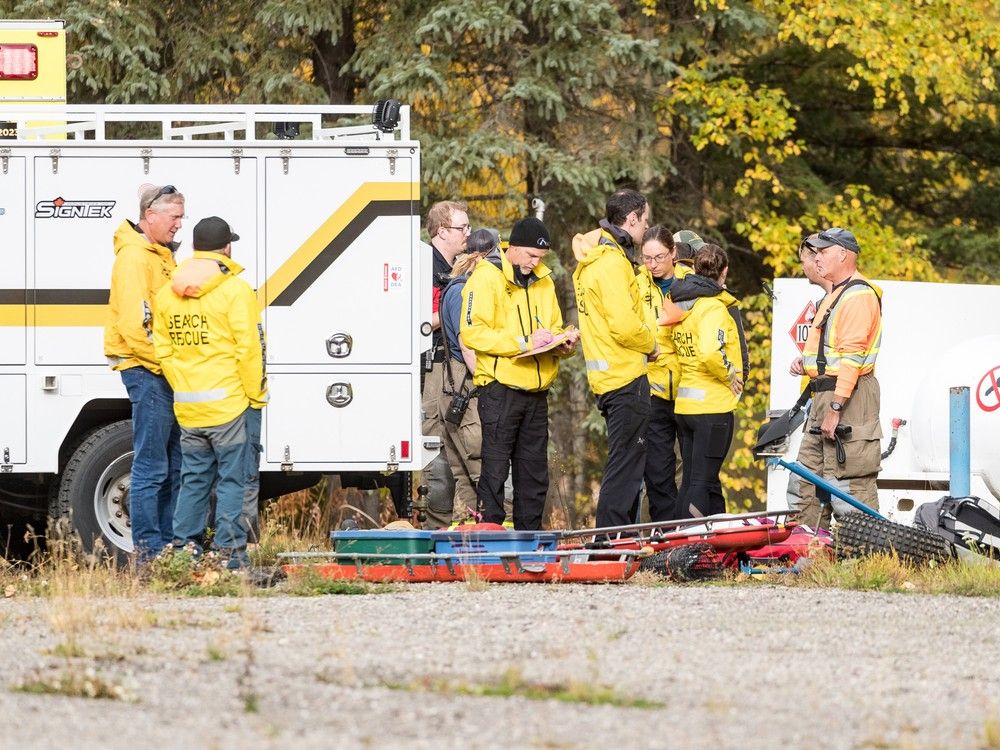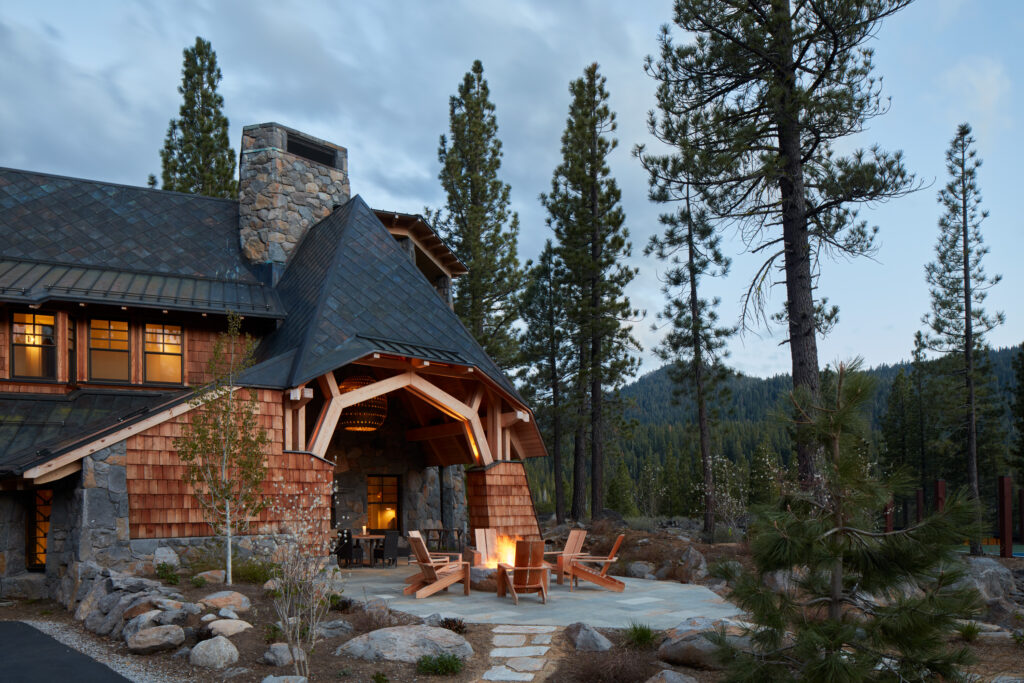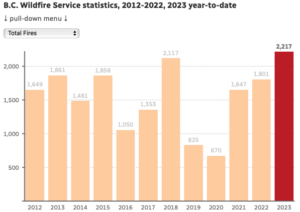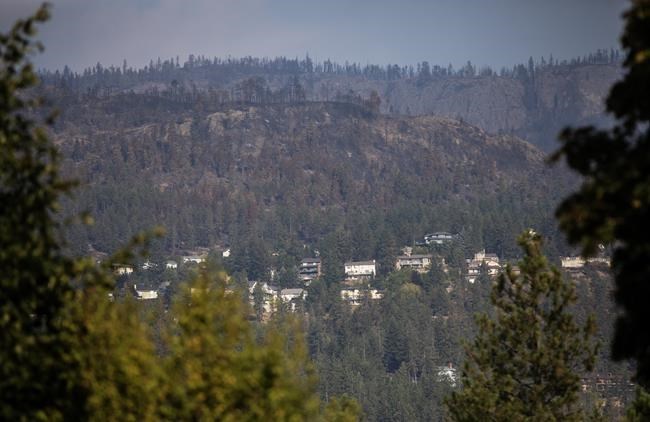 As National Forest Week is celebrated across the country, Forest Products Association of Canada (FPAC) is announcing the winners of its 2023 Awards of Excellence program. FPAC announced that Kari Stuart-Smith, Manager of Biodiversity and Wildlife for Canfor Corporation, is being honoured with the Women in Forestry Award. “The Women in Forestry Award is dedicated to recognizing a female leader who contributes to the dynamic and ever-evolving forest sector while championing workplace diversity and inclusion,” said FPAC President and CEO Derek Nighbor. “Kari Stuart-Smith embodies the spirit of this award through her dedication, leadership, and exceptional contributions to the field of forestry. She has a brilliant scientific mind and represents the best of our industry’s commitment to supporting every living creature and ecosystem in our forests.”
As National Forest Week is celebrated across the country, Forest Products Association of Canada (FPAC) is announcing the winners of its 2023 Awards of Excellence program. FPAC announced that Kari Stuart-Smith, Manager of Biodiversity and Wildlife for Canfor Corporation, is being honoured with the Women in Forestry Award. “The Women in Forestry Award is dedicated to recognizing a female leader who contributes to the dynamic and ever-evolving forest sector while championing workplace diversity and inclusion,” said FPAC President and CEO Derek Nighbor. “Kari Stuart-Smith embodies the spirit of this award through her dedication, leadership, and exceptional contributions to the field of forestry. She has a brilliant scientific mind and represents the best of our industry’s commitment to supporting every living creature and ecosystem in our forests.”

 SMITHERS, BC — West Fraser Timber has made a $100,000 donation to support the Dze L K’ant Housing Society’s Indigenous housing project in Smithers. It will be the society’s first affordable housing development. The funds will enhance the cultural features of the project, as the society recognizes the importance of maintaining culture across generations. …The multi-family, 37-unit housing project will provide affordable housing for Indigenous families and elders. BC Housing is the major funder of the project, which is being developed in partnership with the Town of Smithers through a lease agreement with the municipality for land located at 1611 Main Street. …West Fraser general manger, Dean MacDonald, said his company is committed to building beneficial relationships with Indigenous groups. …Construction of the project is expected to begin in March 2024.
SMITHERS, BC — West Fraser Timber has made a $100,000 donation to support the Dze L K’ant Housing Society’s Indigenous housing project in Smithers. It will be the society’s first affordable housing development. The funds will enhance the cultural features of the project, as the society recognizes the importance of maintaining culture across generations. …The multi-family, 37-unit housing project will provide affordable housing for Indigenous families and elders. BC Housing is the major funder of the project, which is being developed in partnership with the Town of Smithers through a lease agreement with the municipality for land located at 1611 Main Street. …West Fraser general manger, Dean MacDonald, said his company is committed to building beneficial relationships with Indigenous groups. …Construction of the project is expected to begin in March 2024.

 Richmond, BC – Paper Excellence Canada is pleased to announce the resumption of kraft pulp operations at its Catalyst Crofton mill, bringing more than 300 workers back to their jobs. While market conditions allow for the restart of our pulp operations, the curtailment of paper operations at Crofton is being extended to the end of October. “In spite of challenges posed by exceptionally low pulp and paper prices driven by global market fluctuations, we are pleased to announce that we are resuming pulp production and reinstating a portion of our workforce at our Crofton mill. While this is a positive development, we will continue to assess the ongoing viability of maintaining Kraft pulp operations at Crofton to ensure it is cost effective to operate and consistent with our overall business strategies,” said Krista Cuddy, Catalyst Crofton, Interim Director – Operations & Integration.
Richmond, BC – Paper Excellence Canada is pleased to announce the resumption of kraft pulp operations at its Catalyst Crofton mill, bringing more than 300 workers back to their jobs. While market conditions allow for the restart of our pulp operations, the curtailment of paper operations at Crofton is being extended to the end of October. “In spite of challenges posed by exceptionally low pulp and paper prices driven by global market fluctuations, we are pleased to announce that we are resuming pulp production and reinstating a portion of our workforce at our Crofton mill. While this is a positive development, we will continue to assess the ongoing viability of maintaining Kraft pulp operations at Crofton to ensure it is cost effective to operate and consistent with our overall business strategies,” said Krista Cuddy, Catalyst Crofton, Interim Director – Operations & Integration.






 BRITISH COLUMBIA — The 2023 wildfire season is officially the most expensive and most destructive on record. According to the B.C. Wildfire Service (BCWS), a total of 2,217 fires have been detected this year, burning almost 25,000 square kilometres of trees, bush and grassland. That makes it B.C.’s worst season by land burned, easily surpassing the previous record of 13,540 square kilometres in 2018. The cost of fighting those fires is also significantly up, to approximately $770 million so far this year, more than the $649 million spent in 2017. On Thursday, the B.C. government said higher-than-projected costs to fight wildfires had contributed an additional $2.5 billion to the province’s projected deficit for this fiscal year. The government is projecting the total spend for the 2023/24 fiscal year to be $966 million. The majority of this year’s fires — approximately 71 per cent — have been sparked by lightning, while 23 per cent are human-caused, the fire service says.
BRITISH COLUMBIA — The 2023 wildfire season is officially the most expensive and most destructive on record. According to the B.C. Wildfire Service (BCWS), a total of 2,217 fires have been detected this year, burning almost 25,000 square kilometres of trees, bush and grassland. That makes it B.C.’s worst season by land burned, easily surpassing the previous record of 13,540 square kilometres in 2018. The cost of fighting those fires is also significantly up, to approximately $770 million so far this year, more than the $649 million spent in 2017. On Thursday, the B.C. government said higher-than-projected costs to fight wildfires had contributed an additional $2.5 billion to the province’s projected deficit for this fiscal year. The government is projecting the total spend for the 2023/24 fiscal year to be $966 million. The majority of this year’s fires — approximately 71 per cent — have been sparked by lightning, while 23 per cent are human-caused, the fire service says.

 To Nathan Cullen, I am writing to you on the third anniversary of your government’s acceptance of all 14 recommendations within A New Future for Old Forests. That report called for urgency and profound change to accomplish the necessary paradigm shift to adequately respond to the climate emergency and the contribution of our forestry practices to it. The unfolding disaster of our burning forests has reminded us that nature is not listening to government’s inaction. …We have been converting our province, once described as super-natural, into an impoverished landscape, capable of creating only increased risk. …We need to return to a community-based economies that can use truly sustainable harvesting methods that do not degrade the ecologies within which they operate. To do that, you have to rebuild multi-stakeholder community committees as a permanent part of landscape planning. In the meantime, please stop BC Timber Sales and the forest industry from destroying the watersheds within which we live.
To Nathan Cullen, I am writing to you on the third anniversary of your government’s acceptance of all 14 recommendations within A New Future for Old Forests. That report called for urgency and profound change to accomplish the necessary paradigm shift to adequately respond to the climate emergency and the contribution of our forestry practices to it. The unfolding disaster of our burning forests has reminded us that nature is not listening to government’s inaction. …We have been converting our province, once described as super-natural, into an impoverished landscape, capable of creating only increased risk. …We need to return to a community-based economies that can use truly sustainable harvesting methods that do not degrade the ecologies within which they operate. To do that, you have to rebuild multi-stakeholder community committees as a permanent part of landscape planning. In the meantime, please stop BC Timber Sales and the forest industry from destroying the watersheds within which we live.


 The British Columbia Wildfire Service says the fire danger rating across most of the province has dropped to low or very low as cool, damp fall weather arrives. The wildfire service says there have been no new fires in the last 24 hours, and of the 384 active fires burning in B.C., roughly three-quarters are ranked as under control or “being held,” meaning they are not likely to spread. …Cooler conditions mean all open fire prohibitions, including a ban on campfires, lifts on Wednesday in the Coastal Fire Centre, while the Kamloops Fire Centre removes its campfire ban on Thursday. The wildfire service says there have been just over 2,200 wildfires across B.C. since the season began on April 1, charring almost 25,000 square kilometres of trees, bush and grassland, making it B.C.’s worst-ever wildfire season, easily surpassing the previous record of 13,540 square kilometres burned in 2018.
The British Columbia Wildfire Service says the fire danger rating across most of the province has dropped to low or very low as cool, damp fall weather arrives. The wildfire service says there have been no new fires in the last 24 hours, and of the 384 active fires burning in B.C., roughly three-quarters are ranked as under control or “being held,” meaning they are not likely to spread. …Cooler conditions mean all open fire prohibitions, including a ban on campfires, lifts on Wednesday in the Coastal Fire Centre, while the Kamloops Fire Centre removes its campfire ban on Thursday. The wildfire service says there have been just over 2,200 wildfires across B.C. since the season began on April 1, charring almost 25,000 square kilometres of trees, bush and grassland, making it B.C.’s worst-ever wildfire season, easily surpassing the previous record of 13,540 square kilometres burned in 2018.
 Last week’s WFCA Annual Business and Market Summit in Kamloops drew more participants than ever, largely due to the collective need to make sense of this difficult 2023 reforestation season. Drought, heat, wildfire, smoke, snow that evaporated straight into the air barely softening the hardened ground, floods, washouts, delays, inflation, a cold storage facility fire, cancelled projects, rising injury rates, and the list still goes on as crews now wait on the final fall plant on the west coast. One contractor put it bluntly, “This season has been a complete disaster.” By a licensee forester’s account, the seedlings may not be doing well either given the province’s drought. …As difficult a season as this year has been we will have planted 307 million seedlings by this fall according to Ministry of Forests data presented at the Kamloops market summit last week.
Last week’s WFCA Annual Business and Market Summit in Kamloops drew more participants than ever, largely due to the collective need to make sense of this difficult 2023 reforestation season. Drought, heat, wildfire, smoke, snow that evaporated straight into the air barely softening the hardened ground, floods, washouts, delays, inflation, a cold storage facility fire, cancelled projects, rising injury rates, and the list still goes on as crews now wait on the final fall plant on the west coast. One contractor put it bluntly, “This season has been a complete disaster.” By a licensee forester’s account, the seedlings may not be doing well either given the province’s drought. …As difficult a season as this year has been we will have planted 307 million seedlings by this fall according to Ministry of Forests data presented at the Kamloops market summit last week. 












:format(webp)/cloudfront-us-east-1.images.arcpublishing.com/tgam/GJ65NASP4VLYXKSGBXLGO2TYS4.jpg)
 RICHMOND, BC – The Fair Practices Commissioner (FPC) for WorkSafeBC is now up and running. The FPC gives workers, employers and workers’ dependants the opportunity to be heard if a complaint hasn’t been resolved through a WorkSafeBC manager or the organization’s Issue Resolution Office (formerly called the Fair Practices Office). The FPC was established by the provincial government through legislation, and it has a reporting structure that enhances independence from the rest of WorkSafeBC. Fair Practices Commissioner Allan Seckel was appointed in May 2023 by WorkSafeBC’s Board of Directors for a renewable three-year term. “My role is to provide an independent review for workers, employers, and workers’ dependants relating to alleged unfairness by WorkSafeBC,” said Allan Seckel, the Fair Practices Commissioner. “I’m honoured to be the first Fair Practices Commissioner for WorkSafeBC.”
RICHMOND, BC – The Fair Practices Commissioner (FPC) for WorkSafeBC is now up and running. The FPC gives workers, employers and workers’ dependants the opportunity to be heard if a complaint hasn’t been resolved through a WorkSafeBC manager or the organization’s Issue Resolution Office (formerly called the Fair Practices Office). The FPC was established by the provincial government through legislation, and it has a reporting structure that enhances independence from the rest of WorkSafeBC. Fair Practices Commissioner Allan Seckel was appointed in May 2023 by WorkSafeBC’s Board of Directors for a renewable three-year term. “My role is to provide an independent review for workers, employers, and workers’ dependants relating to alleged unfairness by WorkSafeBC,” said Allan Seckel, the Fair Practices Commissioner. “I’m honoured to be the first Fair Practices Commissioner for WorkSafeBC.”